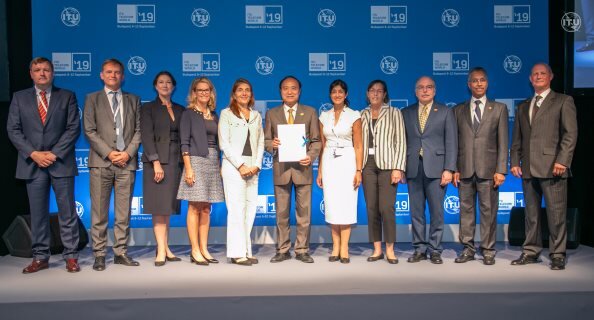International Telecommunication Union (ITU) joins network to boost connectivity in humanitarian crises
"ITU is very proud to be a part of this significant new milestone in bringing ICTs to the aid of people in need,” said ITU Secretary-General Houlin Zhao,who today signs the Charter during the ITU Telecom World 2019 in Budapest, Hungary. “This Crisis Connectivity Charter is an example of what the UN family, the industry and other stakeholders can do when they come together to tackle one of today’s most pressing issues,” he added.
The Crisis Connectivity Charter sets out a process to accelerate access to satellite-based communications when local networks are affected after a disaster. It supports the United Nations World Food Programme (WFP)-led Emergency Telecommunications Cluster (ETC) in implementing its activities to support humanitarian responders and enable them to save lives.
“The Charter is a prime example of humanitarian agencies and the private sector working together to boost humanitarian response. ITU is an integral part of this collaboration and we welcome its inclusion as a Charter signatory,” says Rehan Asad, Chief of Staff at WFP, which leads the Emergency Telecommunications Cluster (ETC).
The ITU maintains crucial relationships with information and communications technology (ICT) ministries and telecommunications regulators globally. In times of crisis, strong coordination with government agencies is essential; the Charter will benefit from the ITU’s strategic connections.
“Through partnerships we can improve outcomes by deploying technology platforms in the hardest hit areas to coordinate response efforts and reach affected communities to save lives,” says Doreen Bogdan-Martin, Director of the Telecommunication Development Bureau of the ITU.
“The Charter had its first official activation during the Cyclone Idai emergency response in Mozambique in March 2019, after which services were extended to the areas affected by Cyclone Kenneth, which hit Mozambique just six weeks later. The ITU was already in the picture, supporting the ETC by liaising with stakeholders to help ease importation and licensing challenges that we faced in the field,” says Enrica Porcari, Chair of the ETC and Chief Information Officer for the World Food Programme (WFP).
The Charter was signed in 2015 and expanded in 2018 with the signing of contribution agreements by eight satellite operators (Arabsat, Eutelsat, Global Eagle, Hispasat, Inmarsat, Intelsat, SES, and Yahsat). Under the contribution agreements, Charter signatories have committed satellite equipment and capacity to humanitarian purposes during emergency responses. The Charter can be activated when a disaster strikes and can identify which pre-planned solutions can be deployed to meet the rapid deployment timelines of a crisis, strengthening the ability of emergency responders to meet humanitarian needs during disasters.
About the Emergency Telecommunications Cluster (ETC)
The ETC is a global network of humanitarian, private sector and governmental organisations that work together in disasters to provide vital communications services. The ETC, in partnership with leading edge technology companies and local telecom providers, is creating an environment for emergency response which allows humanitarian responders, communities and governments to have a seamless, resilient and principled communications experience. The ETC is one of the eleven clusters designated by the Inter-Agency Standing Committee (IASC) and is led by the WFP.
# # #
The United Nations World Food Programme - saving lives in emergencies and changing lives for millions through sustainable development. WFP works in more than 80 countries around the world, feeding people caught in conflict and disasters, and laying the foundations for a better future.
Follow us on Twitter @WFP @ETCluster

